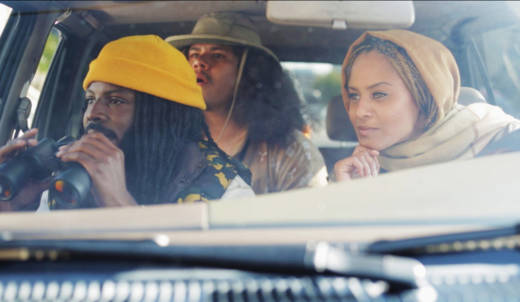Healey: We knew that we wanted to center this story on people who had deep roots in the neighborhood. And really we wanted to do something that showed the multiracial nature of Oakland, of the Bay Area, black and brown folks especially. A lot of these stories are based on real stories.
You’ve done a lot of work taking these issues of environmental justice and climate change and translating them into comedy. In “The North Pole” you’ve got this tech company called “Greengos,” which is basically designing fake trees. They would offset carbon emissions but they would also have surveillance cameras.
Healey: I love Al Gore, he’s cool. Bill Nye the Science Guy? That’s my dude. But the PowerPoint presentations and facts and figures are not enough to reach people. We wanted to do something that addresses the seriousness but also brought the humor, the joy. Comedy is the way to introduce complex issues. It’s a way to acknowledge that even when we’re thinking and talking about these serious things, we also have the little things that make us smile. If we don’t acknowledge those things, then we’re losing the humanity that we’re trying to fight for in the first place.
You produced this show in conjunction with a nonprofit that uses the arts to raise awareness around climate change. It was funded through a Kickstarter campaign, not through a big studio like Amazon or Netflix. What was your pitch to people who contributed?
Healey: If we’re going to change the politics or change the policies around these issues, we have to change the story. We have to rethink and re-imagine who are the heroes and who are the villains. You don’t have very many shows based in the Bay Area, centered on people of color, on young people who are trying to navigate these serious issues in a creative, fun way. It helps that we brought in a lot of our friends and homies in the artistic and activist community. Folks like comedian W. Kamau Bell, rappers Mistah F.A.B. and Boots Riley and one of my great “sheroes,” Ericka Huggins, one of the former leaders of Black Panther Party.
“The North Pole” is a lot about feeling threatened by newcomers who are driving up prices. You are somewhat of an outsider too, from D.C., not Oakland. What was it like to come in and bring that kind of outsider perspective?
Healey: I’m the first to acknowledge I’m not from here originally. A lot of times these conversations get stuck in this cycle of outsider versus insider, homegrown versus newcomer. I look at it differently. Gentrification is just a new name on something that’s been going on in America for a long time. I’m a white boy from Washington, D.C. And I think climate change is just a new name on exacerbated environmental destruction that’s been going on for hundreds of years. No matter where you’re from, you have to acknowledge the root causes of these issues. It’s deeper than the new coffee shop or the new gluten-free doughnut spot on your block. Those are those are the immediate symbols of something that’s gone much deeper. Who are the companies and the politicians and the policies that are really pushing this?
After people watch this, what do you hope it empowers them to do?
Healey: We want people to stand up and to join with their neighbors, to join with their community, to join with their families and to be part of something. We want to activate audiences to become active participants in not just consuming information, but changing the story and becoming part of the story themselves. Individually watching a web series? That’s not going to do nothing. But we also know that some things can spark and become wildfires. And right now we need wildfires of hope. We need wildfires of joy. We need laughter and liberation. We’re trying to broaden the conversation, change the world and talk a little mess along the way.
